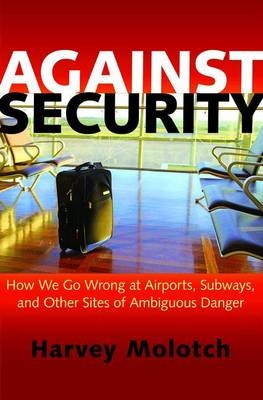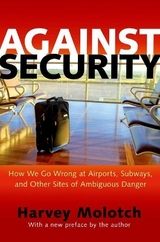
Against Security
How We Go Wrong at Airports, Subways, and Other Sites of Ambiguous Danger
Seiten
2012
Princeton University Press (Verlag)
978-0-691-15581-4 (ISBN)
Princeton University Press (Verlag)
978-0-691-15581-4 (ISBN)
- Titel erscheint in neuer Auflage
- Artikel merken
Zu diesem Artikel existiert eine Nachauflage
In the post-9/11 world, we have become focused on heightened security measures, but do you feel safer? Are you safer? This book explains how our anxieties about public safety have translated into command-and-control procedures that annoy, intimidate, and are often counterproductive.
Remember when an unattended package was just that, an unattended package? Remember when the airport was a place that evoked magical possibilities, not the anxiety of a full-body scan? In the post-9/11 world, we have become focused on heightened security measures, but do you feel safer? Are you safer? Against Security explains how our anxieties about public safety have translated into command-and-control procedures that annoy, intimidate, and are often counterproductive. Taking readers through varied ambiguously dangerous sites, the prominent urbanist and leading sociologist of the everyday, Harvey Molotch, argues that we can use our existing social relationships to make life safer and more humane. He begins by addressing the misguided strategy of eliminating public restrooms, which deprives us all of a basic resource and denies human dignity to those with no place else to go. Subway security instills fear through programs like "See Something, Say Something" and intrusive searches that have yielded nothing of value. At the airport, the security gate causes crowding and confusion, exhausting the valuable focus of TSA staff.
Finally, Molotch shows how defensive sentiments have translated into the vacuous Freedom Tower at the World Trade Center site and massive error in New Orleans, both before and after Hurricane Katrina. Throughout, Molotch offers thoughtful ways of maintaining security that are not only strategic but improve the quality of life for everyone. Against Security argues that with changed policies and attitudes, redesigned equipment, and an increased reliance on our human capacity to help one another, we can be safer and maintain the pleasure and dignity of our daily lives.
Remember when an unattended package was just that, an unattended package? Remember when the airport was a place that evoked magical possibilities, not the anxiety of a full-body scan? In the post-9/11 world, we have become focused on heightened security measures, but do you feel safer? Are you safer? Against Security explains how our anxieties about public safety have translated into command-and-control procedures that annoy, intimidate, and are often counterproductive. Taking readers through varied ambiguously dangerous sites, the prominent urbanist and leading sociologist of the everyday, Harvey Molotch, argues that we can use our existing social relationships to make life safer and more humane. He begins by addressing the misguided strategy of eliminating public restrooms, which deprives us all of a basic resource and denies human dignity to those with no place else to go. Subway security instills fear through programs like "See Something, Say Something" and intrusive searches that have yielded nothing of value. At the airport, the security gate causes crowding and confusion, exhausting the valuable focus of TSA staff.
Finally, Molotch shows how defensive sentiments have translated into the vacuous Freedom Tower at the World Trade Center site and massive error in New Orleans, both before and after Hurricane Katrina. Throughout, Molotch offers thoughtful ways of maintaining security that are not only strategic but improve the quality of life for everyone. Against Security argues that with changed policies and attitudes, redesigned equipment, and an increased reliance on our human capacity to help one another, we can be safer and maintain the pleasure and dignity of our daily lives.
Harvey Molotch is professor of sociology and metropolitan studies at New York University. He is the author of Where Stuff Comes From: How Toasters, Toilets, Cars, Computers, and Many Other Things Come to Be As They Are.
Preface ix Acknowledgments xiii Chapter 1 Introduction: Colors of Security 1 Chapter 2 Bare Life: Restroom Anxiety and the Urge for Control 22 Chapter 3 Below the Subway: Taking Care Day In and Day Out with Noah McClain 50 Chapter 4 Wrong-Way Flights: Pushing Humans Away 85 Chapter 5 Forting Up the Skyline: Rebuilding at Ground Zero 128 Chapter 6 Facing Katrina: Illusions of Levee and Compulsion to Build 154 Chapter 7 Conclusion: Radical Ambiguity and the Default to Decency 192 Notes 225 Index 251
| Erscheint lt. Verlag | 26.8.2012 |
|---|---|
| Zusatzinfo | 1 Maps |
| Verlagsort | New Jersey |
| Sprache | englisch |
| Maße | 152 x 235 mm |
| Gewicht | 567 g |
| Themenwelt | Recht / Steuern ► EU / Internationales Recht |
| Sozialwissenschaften ► Soziologie | |
| ISBN-10 | 0-691-15581-X / 069115581X |
| ISBN-13 | 978-0-691-15581-4 / 9780691155814 |
| Zustand | Neuware |
| Haben Sie eine Frage zum Produkt? |
Mehr entdecken
aus dem Bereich
aus dem Bereich
Vertrag über die Europäische Union, Vertrag über die Arbeitsweise der …
Buch | Softcover (2024)
dtv Verlagsgesellschaft
15,90 €



